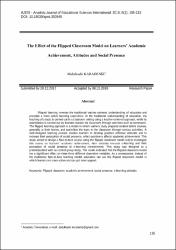| dc.date.accessioned | 2020-07-20T07:02:15Z | |
| dc.date.available | 2020-07-20T07:02:15Z | |
| dc.date.issued | 2018 | en_US |
| dc.identifier.citation | Karadeniz, A. (2018). The effect of the flipped classroom model on learners’ academic achievement, attitudes and social presence. Anadolu Journal of Educational Sciences International (AJESI), 8 (1), 195-213. | en_US |
| dc.identifier.issn | 2146-4014 | |
| dc.identifier.uri | https://hdl.handle.net/11421/24249 | |
| dc.description.abstract | Flipped learning reverses the traditional teacher-centered understanding of education and
provides a more active learning experience. In the traditional understanding of education, the
teaching of a topic is carried out in a classroom setting using a teacher-centered approach, while its
assimilation is carried out by learners outside the classroom through activities such as homework.
The flipped learning approach is a model in which learners study prepared content before courses,
generally at their homes, and assimilate the topic in the classroom through various activities. A
well-designed learning process enables learners to develop positive affective attitudes and to
increase their perception of social presence, which positively affects academic achievement. This
study aimed to design a face-to-face course using the flipped classroom model and to investigate
this course on learners’ academic achievement, their attitudes towards e-learning and their
perception of social presence in e-learning environments. This study was designed as a
pretest/posttest with no control group study. The results indicated that the flipped classroom model
has a significant effect on these three different dependent variables. As a consequence, instead of
the traditional face-to-face learning model, educators can use the flipped classroom model in
which learners are more active and can get more support. | en_US |
| dc.language.iso | eng | en_US |
| dc.publisher | Anadolu Üniversitesi | en_US |
| dc.rights | info:eu-repo/semantics/openAccess | en_US |
| dc.subject | Flipped Classroom | en_US |
| dc.subject | Academic Achievement | en_US |
| dc.subject | Social Presence | en_US |
| dc.subject | E-Learning Attitudes | en_US |
| dc.title | The effect of the flipped classroom model on learners’ academic achievement, attitudes and social presence | en_US |
| dc.type | article | en_US |
| dc.relation.journal | Anadolu Journal of Educational Sciences International (AJESI) | en_US |
| dc.contributor.department | Anadolu Üniversitesi | en_US |
| dc.identifier.volume | 8 | en_US |
| dc.identifier.issue | 1 | en_US |
| dc.identifier.startpage | 195 | en_US |
| dc.identifier.endpage | 213 | en_US |
| dc.relation.publicationcategory | Makale - Ulusal Hakemli Dergi - Kurum Öğretim Elemanı | en_US |
| dc.contributor.institutionauthor | Karadeniz, Abdulkadir | |


















